Why FreshBooks, Bonsai, and Wave Don't Have AI Contract Parsing (Yet)
I analyzed the top invoicing platforms to see who has contract intelligence. The results are surprising: FreshBooks is a $1 billion unicorn with zero AI. Bonsai has AI for proposals but not invoices. Wave has nothing at all. Here is why they are missing this feature, and what it means for freelancers.
The State of AI in Invoicing (2025)
I spent the last week looking at every major invoicing platform. I wanted to know who has AI contract intelligence and who does not. The results were... honestly kind of shocking.
Out of 13 platforms, only 2 have true AI contract parsing. That is 15% of the market. Which means 85% of invoicing tools still make you manually copy contract terms into invoices like it is 2015.
Let me show you what I found.
FreshBooks: A $1 Billion Unicorn with Zero AI
This one surprised me the most. FreshBooks has over 30 million users, a $1 billion valuation, and they have been in business for 20+ years. They are a mature, well-funded company.
And they have exactly zero AI capabilities.
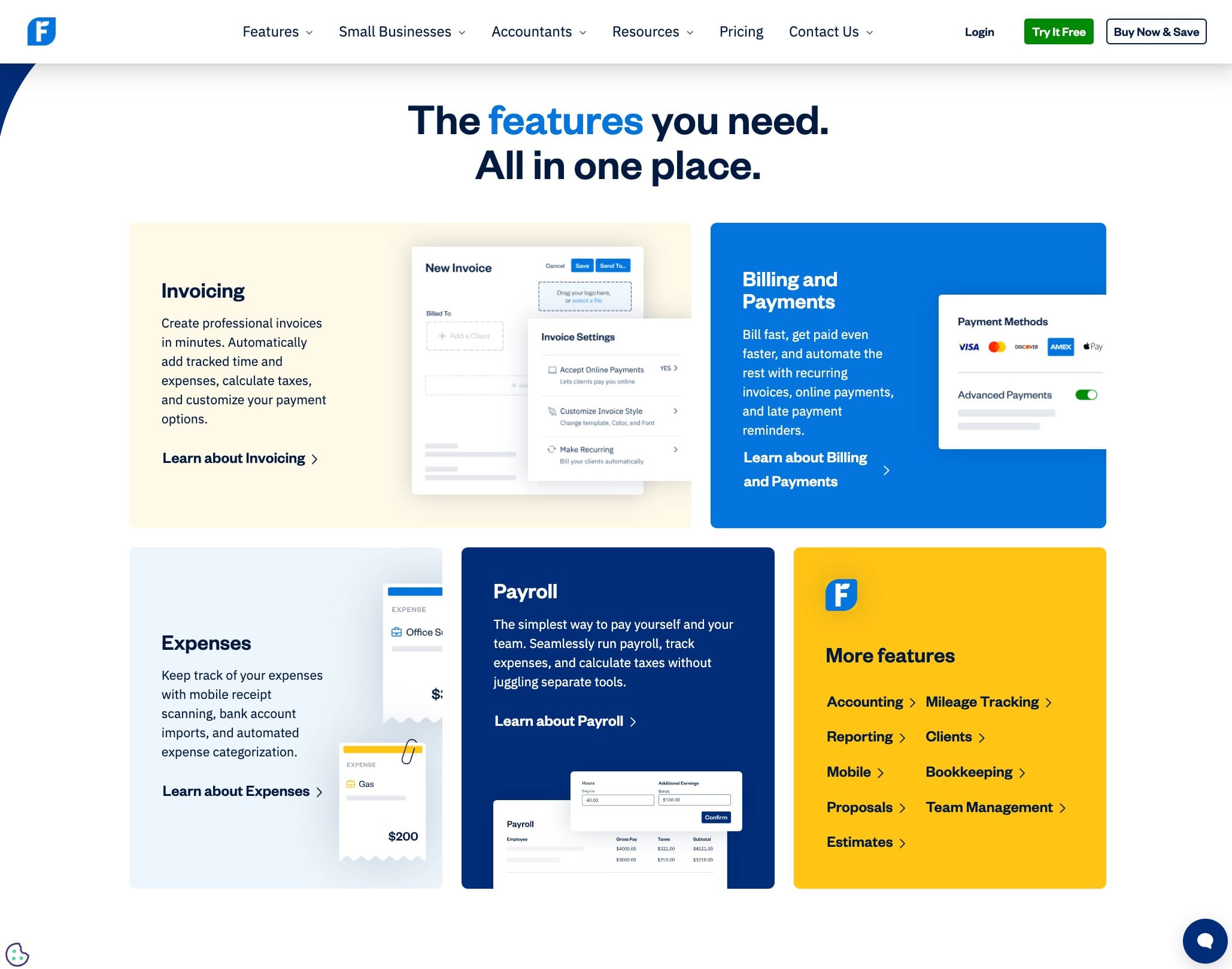
Here is their invoice creation process:
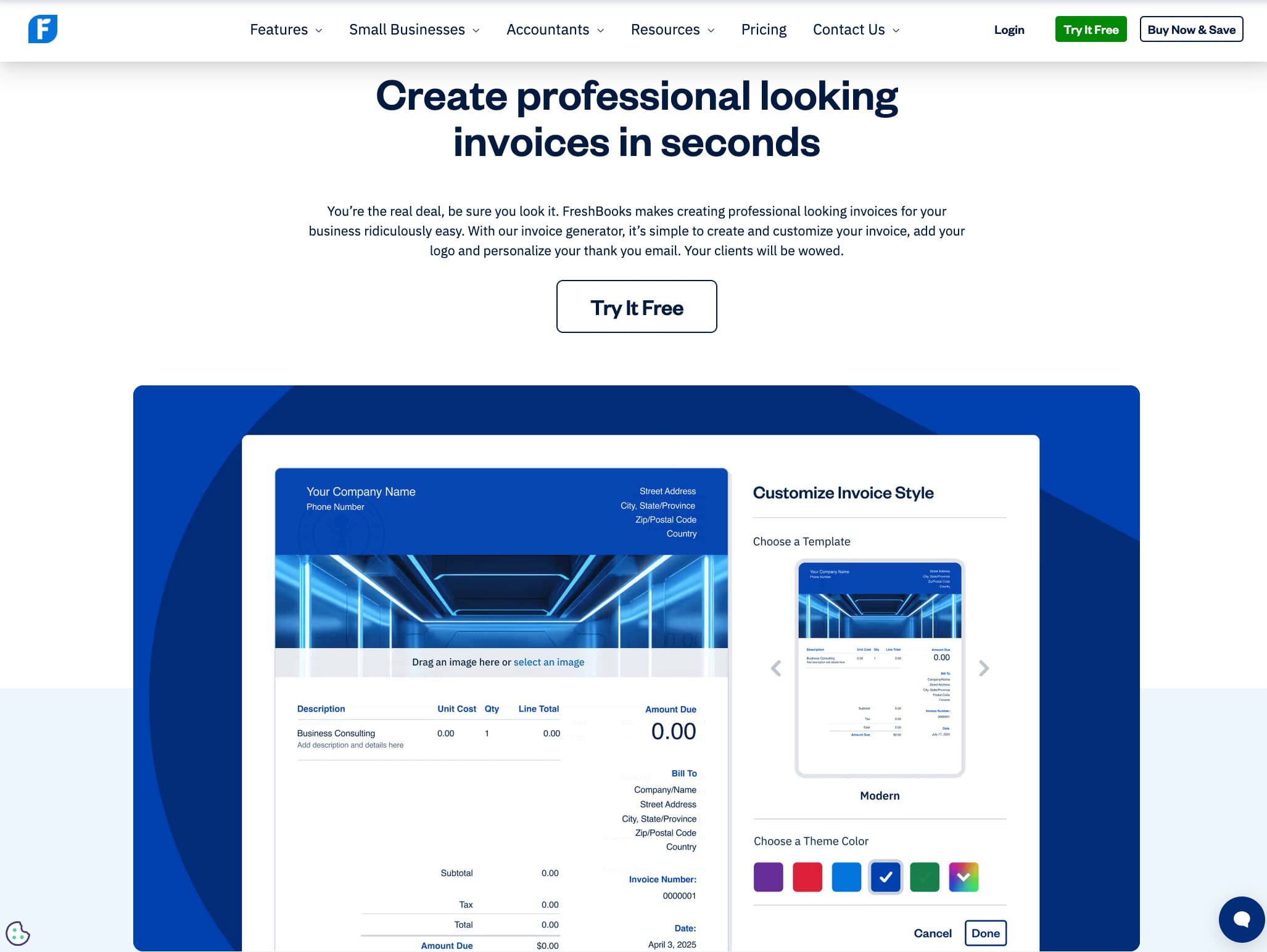
You manually enter your company name, client details, line items, unit costs, quantities. It is form-filling all the way down. No AI. No smart categorization. No predictive anything.
FreshBooks does have some automation:
- Recurring invoices (you can schedule them to go out automatically)
- Late payment reminders (auto-send emails when invoices are overdue)
- Online payments (clients can pay via credit card, bank transfer)
But that is scheduling and workflow automation. Not AI. The actual invoice creation? 100% manual.
Why This Is Wild
Think about this: FreshBooks is valued at $1 billion. They have the resources to build anything. They have 30 million users who would benefit from AI contract parsing. And they just... have not built it.
It is like Tesla making electric cars for 15 years and never adding autopilot. The technology exists. The use case is obvious. But they have not shipped it.
My guess? They are working on it. They have to be. But as of November 2025, it is not there.
Bonsai: AI for Proposals, Manual for Invoices
Bonsai is smarter about AI. They have an AI text generator that helps you write proposals and other documents. It is actually pretty useful. You can generate proposal copy based on your project scope.
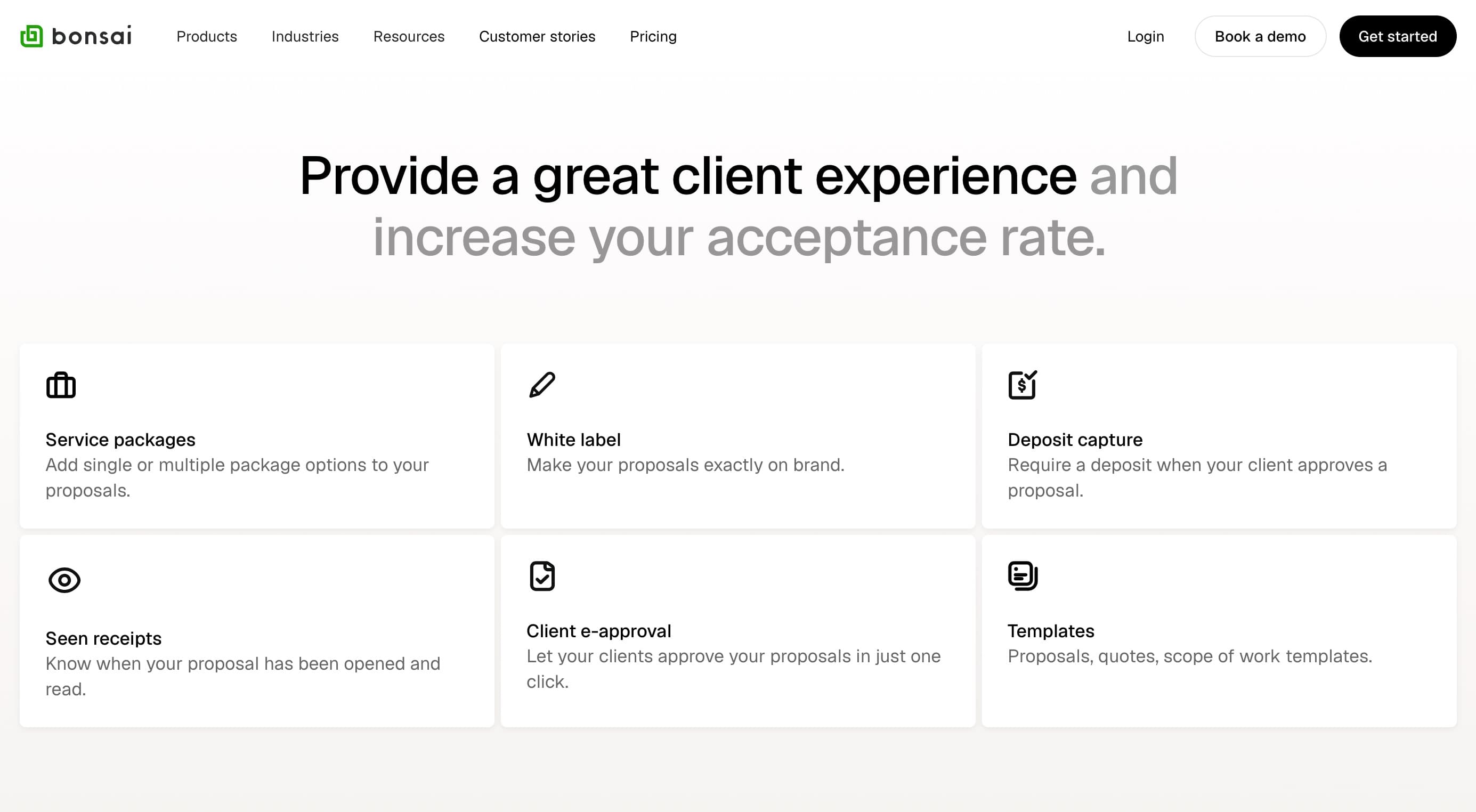
But here is the thing: that AI is only for proposals. Not for invoicing.
When you go to create an invoice in Bonsai, you are back to manual data entry. You select the client, create a project name, add line items by hand. There is no AI reading your contract and auto-populating the invoice.
Bonsai does have workflow automation. You can set up triggers like "when a project is marked complete, automatically send an invoice." That is useful. But it is not AI. It is if-then rules.
Why Bonsai Has AI for Proposals But Not Invoices
I think Bonsai made a strategic choice. Proposals are hard to write. Clients want customization, personalization, persuasive copy. AI helps with that.
Invoices, on the other hand? They are just data entry. Bonsai probably figured "users can fill out a form, it is not that hard." Which is true, you can fill out the form. But it still takes 10-15 minutes per invoice.
What they are missing is that contract intelligence is not about making invoices easier to create. It is about eliminating the need to create them manually at all.
If you have a contract with all the terms already spelled out, why should you have to re-enter that data into an invoice? The AI should just read the contract and do it for you.
Bonsai has the AI capability. They just have not applied it to the invoicing workflow yet.
Wave: No AI, But It Is Free
Wave is interesting because they are completely free. No subscription fees at all.
They make money on payment processing (they charge 2.9% + 30¢ for credit card payments) and optional payroll services. The invoicing itself is free.
And with that free price tag, you get zero AI.
Wave is pure manual invoicing. You fill out forms. You add line items. You type in client details. There is no smart categorization, no predictive features, no automation.
Which is fine. Wave is free. You get what you pay for. But if you are looking for AI contract intelligence, Wave is not even trying to build it.
Why Wave Does Not Have AI
Wave's business model is different from everyone else. They are not charging for the software. They are charging for payments and payroll.
Building AI costs money. Training models, handling edge cases, maintaining infrastructure (that is not cheap). And if you are giving the software away for free, it is hard to justify the R&D investment.
Wave is optimizing for simplicity and low cost. AI contract parsing is neither of those things.
QuickBooks: Has AI, But Not for Contracts
QuickBooks is the interesting one. They do have AI. A lot of it. Intuit launched Intuit Assist in 2023, and they have been rolling out AI Agents across all their products.
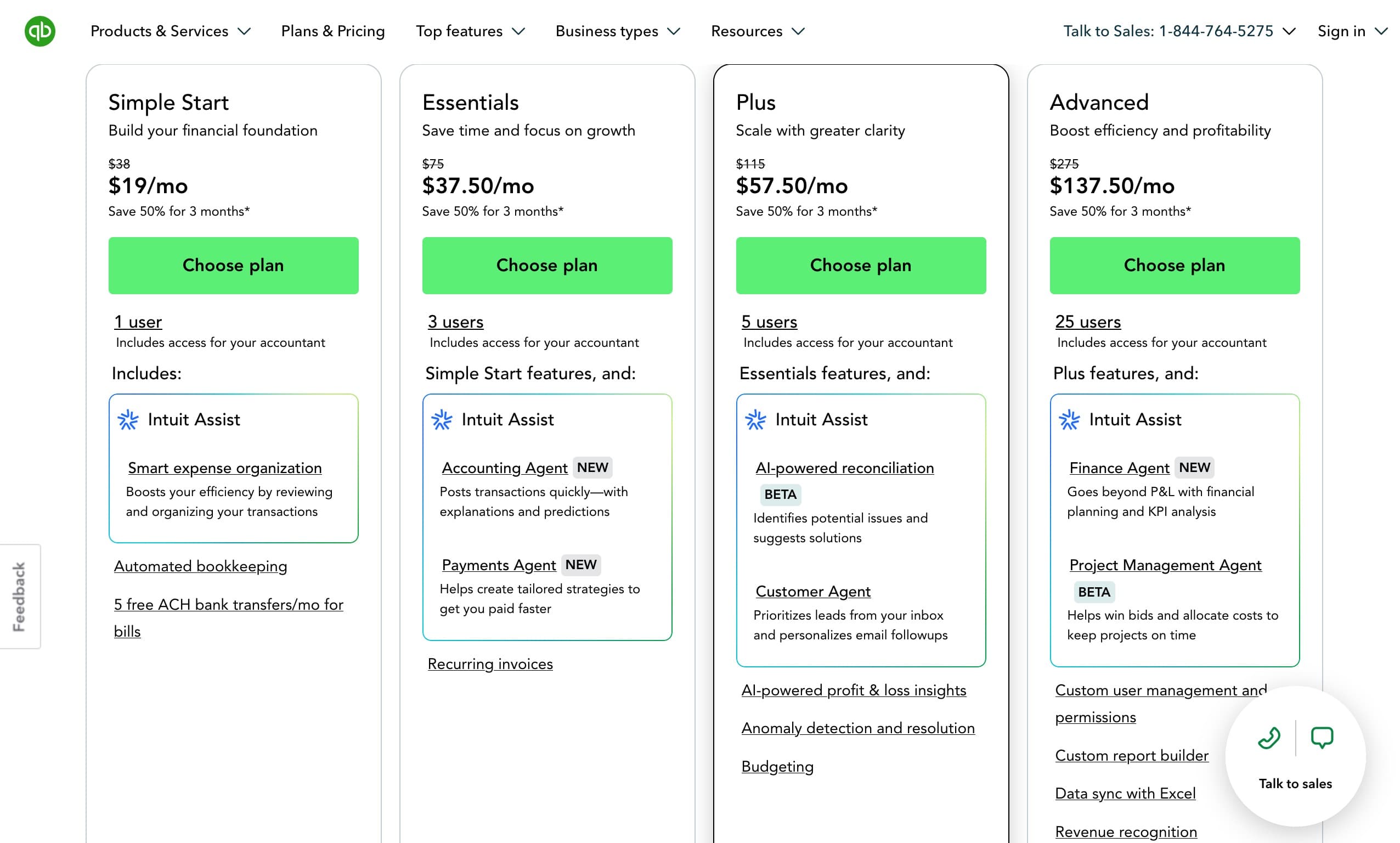
Here is what QuickBooks AI can do:
- Smart expense organization: AI categorizes transactions automatically
- Accounting Agent: Posts transactions quickly with explanations and predictions
- Payments Agent: Helps create tailored strategies to get paid faster
- AI-powered reconciliation: Identifies potential issues and suggests solutions
- Finance Agent: Goes beyond P&L with financial planning and KPI analysis
- Customer Agent: Prioritizes leads from your inbox and personalizes email follow-ups
This is legit AI. Multiple agents, handling complex accounting tasks, saving time.
But notice what is missing: contract intelligence.
QuickBooks AI can categorize expenses, reconcile accounts, predict cash flow, and suggest tax deductions. But it cannot read a contract and auto-generate an invoice.
Which is bizarre, because that seems like the most obvious use case. QuickBooks has 47 million users. A huge chunk of them are freelancers and small agencies who work on contract-based projects.
Those users have signed contracts. They need to create invoices based on those contracts. They spend 10-15 minutes per invoice manually entering contract terms.
And QuickBooks just... does not have AI for that.
Why QuickBooks Does Not Have Contract Intelligence (Yet)
My guess? They are focused on accounting AI first. Categorizing transactions, balancing books, predicting cash flow (that is core QuickBooks functionality). Contract intelligence is more niche.
But I think they will add it. Probably by acquiring someone. Intuit has been on an AI acquisition spree (GoCo, Relevvo, Deserve). They clearly believe in buying capabilities instead of building them all internally.
Contract intelligence is the kind of thing Intuit would acquire. It is a solved problem (Paidly and JustPaid have already built it), it fits their product roadmap, and it would give them a feature no other major platform has.
Timeline? My guess is 12-18 months.
Read more: Why Intuit Should Acquire a Contract Intelligence Startup →
What About JustPaid?
JustPaid is the exception. They do have AI contract intelligence. In fact, it is their main feature.
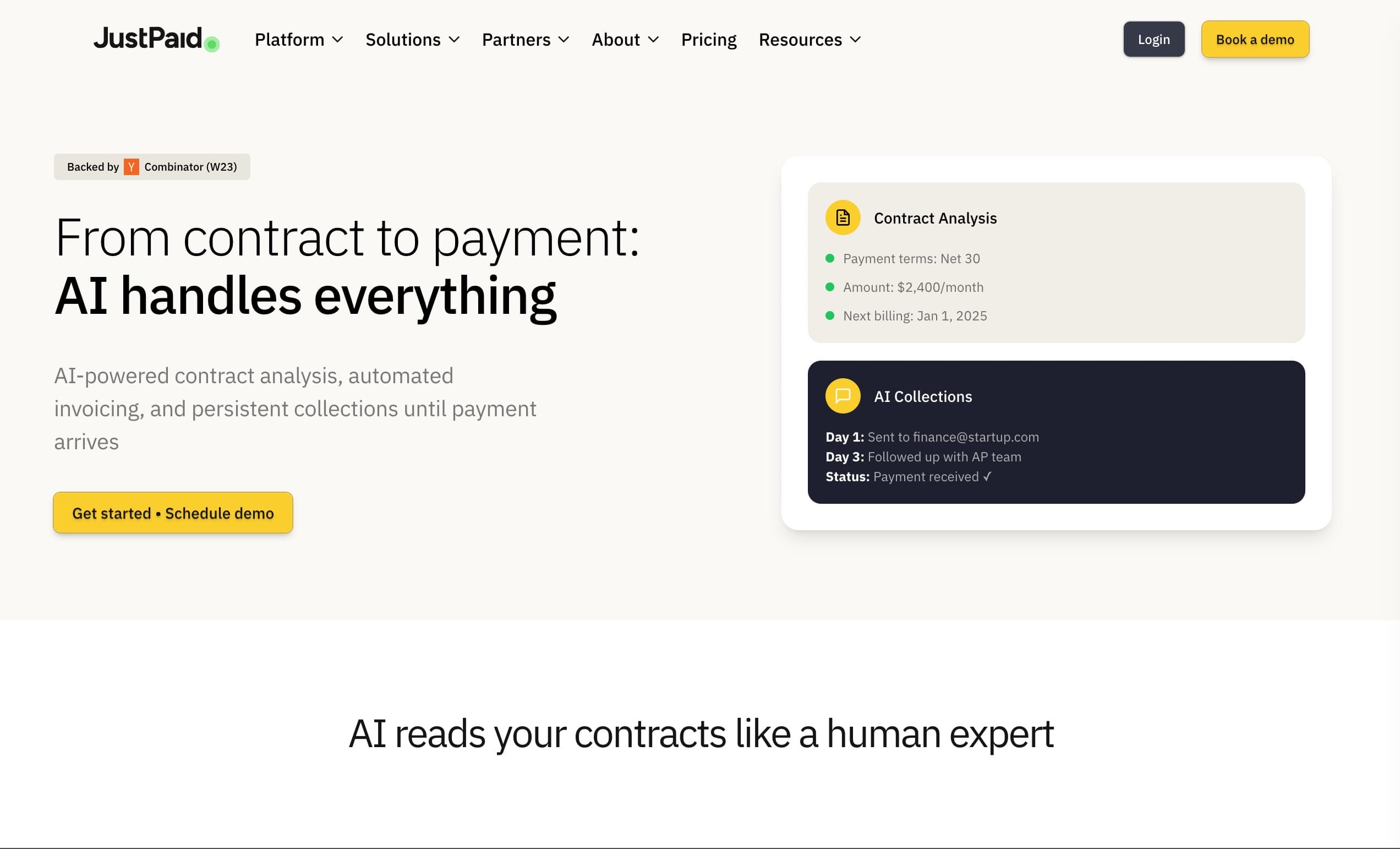
JustPaid's tagline is "From contract to payment: AI handles everything."
Their AI:
- Reads contracts (PDF, Word, images)
- Extracts payment terms, amounts, billing schedules
- Auto-generates invoices
- Sends persistent collections until payment arrives
They are YC-backed (W23), raised $3.5M, and hit $2.1M ARR in 2024. So the tech works, and customers are paying for it.
But JustPaid is focused on B2B/enterprise. Their pricing is custom (likely $500-5k/mo range). If you are a freelancer or small agency, they are probably too expensive and too enterprise-focused.
See the full comparison: The Only Invoicing Tools with AI Contract Parsing →
Why Do These Gaps Exist?
Okay, so FreshBooks has no AI at all. Bonsai has AI for proposals but not invoices. Wave has nothing. QuickBooks has AI for accounting but not contracts. Why?
Reason 1: AI Costs Are High (If You Use OpenAI)
Most companies default to OpenAI for document parsing because it is the best-known option. And OpenAI is expensive. GPT-4 costs around $0.01-0.03 per contract parse.
At scale, that is rough unit economics. If you have 1 million users and 10% of them parse a contract once a month, that is 100,000 parses. At $0.01 each, that is $1,000/month just in API costs. And that is before infrastructure, support, development costs.
For a $29/month tool, spending $0.01 per parse means you need users to parse fewer than 2,900 contracts per month to break even. That is doable, but it is tight.
For a free tool like Wave? That math does not work at all. They would be paying API costs with no revenue to offset it.
Now, you can use cheaper models. Google Gemini 2.0 Flash-Lite costs $0.0002 per parse (43 times cheaper than OpenAI). But you have to know that model exists, trust it is accurate enough, and be willing to bet on it.
Most companies are not there yet.
Reason 2: OCR Is Still Hard
Typed PDFs are easy to parse. But scanned contracts? Photos of signed paper documents? Handwritten notes? Those require OCR, and even modern AI struggles with accuracy.
If you have a scanned contract with coffee stains, crumpled corners, and mediocre lighting, accuracy drops to 80-85%. That is not good enough for invoicing. One wrong number means payment delays and client confusion.
So companies wait. They wait for OCR to get better, for accuracy to hit 95%+, for edge cases to be solved. Which takes time.
Reason 3: Contracts Are Not Standardized
Every lawyer, every company, every freelancer formats contracts differently. Some use tables for payment terms. Some use bullet points. Some bury the rate in paragraph 7, subsection C.
Training AI to handle all these variations is not trivial. You need hundreds or thousands of sample contracts, extensive testing, and smart edge case handling.
Paidly and JustPaid have spent months solving this. Most companies do not want to invest that much R&D into a single feature.
Reason 4: It Is Not Core to Their Business (Yet)
FreshBooks does invoicing, but also expenses, accounting, time tracking, project management. Invoicing is one feature among many.
Bonsai does proposals, contracts, time tracking, invoicing. Contract intelligence only improves the invoicing piece.
Wave is focused on being free and simple. AI adds complexity and cost. That runs counter to their model.
QuickBooks does full accounting. Contract intelligence is useful, but it is not core to bookkeeping, payroll, tax prep.
Only JustPaid (and Paidly) are built entirely around contract-to-invoice automation. For everyone else, it is a nice-to-have, not a must-have.
Reason 5: Low Market Awareness
Most freelancers do not even know AI contract parsing is possible. They have been manually creating invoices for years. It is just "how it is done."
If users are not asking for a feature, product teams deprioritize it. Which means contract intelligence is in a chicken-and-egg phase: users do not ask for it because they do not know it exists, and companies do not build it because users are not asking.
JustPaid and Paidly are trying to create the market. But it is early. Most people still do not know this is possible.
What Happens Next?
Here is my prediction for how this plays out:
Next 6 months (Q1-Q2 2026): FreshBooks, Bonsai, and QuickBooks start noticing contract intelligence. They see JustPaid's traction ($2.1M ARR), they see Paidly launching, they realize this is becoming a thing. Internal teams start scoping out what it would take to build.
6-12 months (Q2-Q4 2026): One of the big players (probably Intuit) decides to acquire instead of build. They buy Paidly or JustPaid, integrate the tech into QuickBooks or Bill.com, and launch it as a differentiator. PR goes out: "We are the first major platform with contract intelligence."
12-18 months (2027): Competitors scramble. FreshBooks, Bonsai, Wave all start building contract intelligence internally or looking for acquisition targets. But the good targets are already gone. So they are 12-18 months behind.
18-24 months (2027-2028): Contract intelligence becomes table-stakes. Every major platform has it or is shipping it soon. The competitive advantage is over. It is just an expected feature, like "attach a PDF" or "send via email."
We are in the early phase right now. Only 2 tools have it. In 18 months, everyone will have it. The question is who moves first.
What This Means for Freelancers
If you are a freelancer using one of these tools, here is what you should know:
If you use FreshBooks: You are stuck with manual invoicing for now. FreshBooks will probably add AI eventually, but as of November 2025, it is not there. You will save 95-145 minutes per month by switching to a tool with contract intelligence.
If you use Bonsai: You have AI for proposals, which is great. But invoicing is still manual. Bonsai might add contract intelligence in the next 12-18 months, but they have not announced anything yet.
If you use Wave: You are paying with your time instead of money. Wave is free, but you are spending 10-15 minutes per invoice on data entry. Whether that tradeoff is worth it depends on how many invoices you send and what your billable rate is.
If you use QuickBooks: You have excellent accounting AI, but no contract intelligence. Intuit will probably acquire this capability in the next 12-18 months. But until then, you are manually creating invoices.
If you want contract intelligence now: Your options are Paidly (freelancers, $29/mo, see how it works) or JustPaid (B2B/enterprise, $500+/mo). That is it. Those are the only two.
The Honest Take
Look, I am the founder of Paidly, so obviously I think contract intelligence matters. But even if you remove my bias, the data is clear:
Freelancers spend 10-15 minutes per invoice manually copying contract terms. If you send 10 invoices per month, that is 100-150 minutes of pure data entry. At $100/hour, that is $160-250/month in lost billable time.
AI can do that in 30 seconds. The technology exists. JustPaid is already doing $2.1M ARR with it. Paidly just launched with it. It works.
So why do FreshBooks, Bonsai, Wave, and QuickBooks not have it? Mostly because they are focused on other things. Accounting AI. Proposal automation. Staying free. They will get here eventually. But they are not here yet.
For freelancers, that means you have a choice: keep manually creating invoices with your current tool, or switch to one of the 2 platforms that have solved this.
In 18 months, everyone will have contract intelligence. But right now, in November 2025,only 2 tools do. That window will not last long.
Related Articles
- The Only Invoicing Tools with AI Contract Parsing (2025)
Complete analysis: Only 2 of 13 major platforms have contract intelligence
- Why Intuit Should Acquire a Contract Intelligence Startup
Strategic analysis: Why QuickBooks should buy contract intelligence in next 12-18 months
- How to Create an Invoice from a Contract in 30 Seconds
Step-by-step guide showing how AI contract parsing actually works
Try Contract Intelligence Today
Upload a contract, watch AI extract all the data, generate an invoice in 30 seconds. Free 14-day trial, no credit card required.
Try Paidly Free →